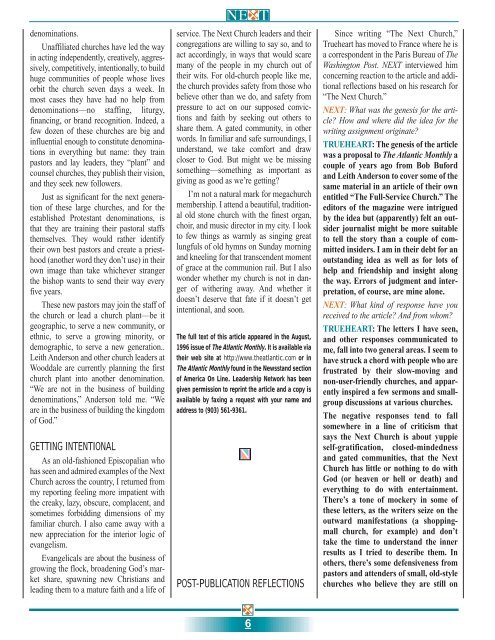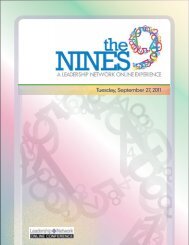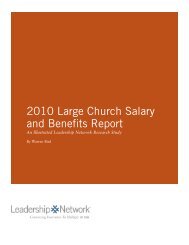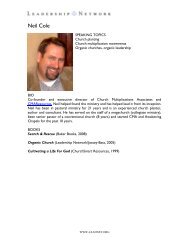ARE WE A PEOPLE AT HALF TIME? - Leadership Network
ARE WE A PEOPLE AT HALF TIME? - Leadership Network
ARE WE A PEOPLE AT HALF TIME? - Leadership Network
You also want an ePaper? Increase the reach of your titles
YUMPU automatically turns print PDFs into web optimized ePapers that Google loves.
denominations.<br />
Unaffiliated churches have led the way<br />
in acting independently, creatively, aggressively,<br />
competitively, intentionally, to build<br />
huge communities of people whose lives<br />
orbit the church seven days a week. In<br />
most cases they have had no help from<br />
denominations—no staffing, liturgy,<br />
financing, or brand recognition. Indeed, a<br />
few dozen of these churches are big and<br />
influential enough to constitute denominations<br />
in everything but name: they train<br />
pastors and lay leaders, they “plant” and<br />
counsel churches, they publish their vision,<br />
and they seek new followers.<br />
Just as significant for the next generation<br />
of these large churches, and for the<br />
established Protestant denominations, is<br />
that they are training their pastoral staffs<br />
themselves. They would rather identify<br />
their own best pastors and create a priesthood<br />
(another word they don’t use) in their<br />
own image than take whichever stranger<br />
the bishop wants to send their way every<br />
five years.<br />
These new pastors may join the staff of<br />
the church or lead a church plant—be it<br />
geographic, to serve a new community, or<br />
ethnic, to serve a growing minority, or<br />
demographic, to serve a new generation..<br />
Leith Anderson and other church leaders at<br />
Wooddale are currently planning the first<br />
church plant into another denomination.<br />
“We are not in the business of building<br />
denominations,” Anderson told me. “We<br />
are in the business of building the kingdom<br />
of God.”<br />
GETTING INTENTIONAL<br />
As an old-fashioned Episcopalian who<br />
has seen and admired examples of the Next<br />
Church across the country, I returned from<br />
my reporting feeling more impatient with<br />
the creaky, lazy, obscure, complacent, and<br />
sometimes forbidding dimensions of my<br />
familiar church. I also came away with a<br />
new appreciation for the interior logic of<br />
evangelism.<br />
Evangelicals are about the business of<br />
growing the flock, broadening God’s market<br />
share, spawning new Christians and<br />
leading them to a mature faith and a life of<br />
service. The Next Church leaders and their<br />
congregations are willing to say so, and to<br />
act accordingly, in ways that would scare<br />
many of the people in my church out of<br />
their wits. For old-church people like me,<br />
the church provides safety from those who<br />
believe other than we do, and safety from<br />
pressure to act on our supposed convictions<br />
and faith by seeking out others to<br />
share them. A gated community, in other<br />
words. In familiar and safe surroundings, I<br />
understand, we take comfort and draw<br />
closer to God. But might we be missing<br />
something—something as important as<br />
giving as good as we’re getting<br />
I’m not a natural mark for megachurch<br />
membership. I attend a beautiful, traditional<br />
old stone church with the finest organ,<br />
choir, and music director in my city. I look<br />
to few things as warmly as singing great<br />
lungfuls of old hymns on Sunday morning<br />
and kneeling for that transcendent moment<br />
of grace at the communion rail. But I also<br />
wonder whether my church is not in danger<br />
of withering away. And whether it<br />
doesn’t deserve that fate if it doesn’t get<br />
intentional, and soon.<br />
The full text of this article appeared in the August,<br />
1996 issue of The Atlantic Monthly. It is available via<br />
their web site at http://www.theatlantic.com or in<br />
The Atlantic Monthly found in the Newsstand section<br />
of America On Line. <strong>Leadership</strong> <strong>Network</strong> has been<br />
given permission to reprint the article and a copy is<br />
available by faxing a request with your name and<br />
address to (903) 561-9361.<br />
POST-PUBLIC<strong>AT</strong>ION REFLECTIONS<br />
Since writing “The Next Church,”<br />
Trueheart has moved to France where he is<br />
a correspondent in the Paris Bureau of The<br />
Washington Post. NEXT interviewed him<br />
concerning reaction to the article and additional<br />
reflections based on his research for<br />
“The Next Church.”<br />
NEXT: What was the genesis for the article<br />
How and where did the idea for the<br />
writing assignment originate<br />
TRUEHEART: The genesis of the article<br />
was a proposal to The Atlantic Monthly a<br />
couple of years ago from Bob Buford<br />
and Leith Anderson to cover some of the<br />
same material in an article of their own<br />
entitled “The Full-Service Church.” The<br />
editors of the magazine were intrigued<br />
by the idea but (apparently) felt an outsider<br />
journalist might be more suitable<br />
to tell the story than a couple of committed<br />
insiders. I am in their debt for an<br />
outstanding idea as well as for lots of<br />
help and friendship and insight along<br />
the way. Errors of judgment and interpretation,<br />
of course, are mine alone.<br />
NEXT: What kind of response have you<br />
received to the article And from whom<br />
TRUEHEART: The letters I have seen,<br />
and other responses communicated to<br />
me, fall into two general areas. I seem to<br />
have struck a chord with people who are<br />
frustrated by their slow-moving and<br />
non-user-friendly churches, and apparently<br />
inspired a few sermons and smallgroup<br />
discussions at various churches.<br />
The negative responses tend to fall<br />
somewhere in a line of criticism that<br />
says the Next Church is about yuppie<br />
self-gratification, closed-mindedness<br />
and gated communities, that the Next<br />
Church has little or nothing to do with<br />
God (or heaven or hell or death) and<br />
everything to do with entertainment.<br />
There’s a tone of mockery in some of<br />
these letters, as the writers seize on the<br />
outward manifestations (a shoppingmall<br />
church, for example) and don’t<br />
take the time to understand the inner<br />
results as I tried to describe them. In<br />
others, there’s some defensiveness from<br />
pastors and attenders of small, old-style<br />
churches who believe they are still on<br />
6







